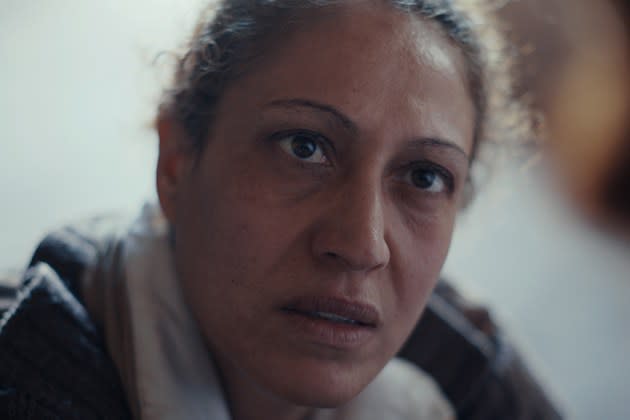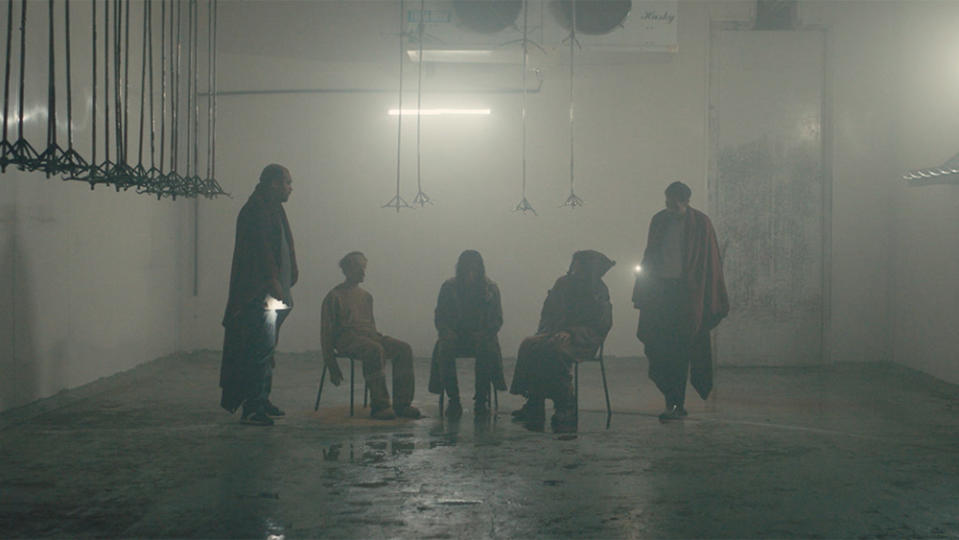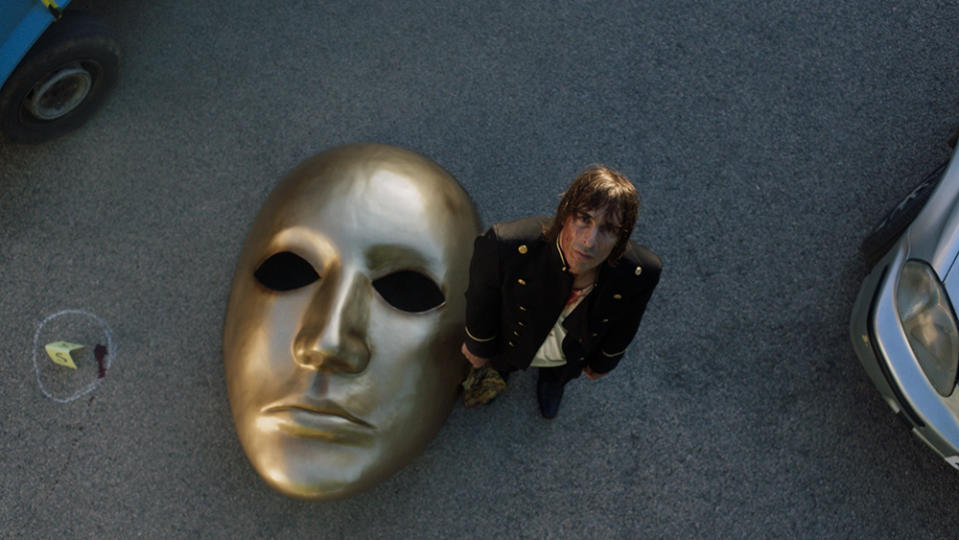Atlas Workshops: Mentored by Martin Scorsese, Marrakech’s Industry Platform Unveils New Titles From Bold New Voices in Arab, African Cinema
- Oops!Something went wrong.Please try again later.
- Oops!Something went wrong.Please try again later.

Tunisian Youssef Chebbi’s “Plague,” Moroccan Adnane Baraka’s “We Don’t Forget” and Meryam Joobeur’s “Motherhood” feature among buzz titles at this year’s Marrakech Festival Atlas Workshops, which will have Martin Scorsese as their official patron.
Consolidated as a key platform for Moroccan, Arab and African projects and pix in production made by a new generation of filmmakers and created by Marrakech Festival artistic director Remi Bonhomme, the Atlas Workshops unspool Nov. 27-30. They take place alongside the 20th edition of the Marrakech International Film Festival, which runs from Nov. 24-Dec. 2.
More from Variety
In a definite potential highlight of the Atlas Workshops, Meryjam Joubeur, whose “Brotherhood” was Oscar nominated for best live action short, will present 10 minutes of “Motherhood,” one of the awaited feature debuts of 2023. It is sure to spark major festival interest.
“Plague” marks Chebbi’s second feature after acclaimed Cannes Directors’ Fortnight genre blender “Ashkal: The Tunisian Investigation,” part procedural, part allegory, part supernatural thriller and a Yellow Veil pick-up after a 2022 Toronto screening.
Baraka’s “We Don’t Forget” returns to themes of his Locarno Filmmakers of the Present debut “Fragments From Heaven,” such as the dichotomy of faith and rationality.
In projects on development, there’s also good word on two debuts from women directors from Lebanon: Sandra Tebet’s “Rabies” and Leila Basma’s “Running With Beasts,” British-Moroccan filmmaker Hind Bensari’s “Out of School,” and “Il Padre Selvaggio,” a first feature project of still young but eminent photographer-video artist Sammy Baloji, featured in a Power 100, the annual ranking of the most influential people in art by the British magazine ArtReview.

Films in production also take in “Agora,” from conceptual artist Ala Eddine Slim (“The Last of Us”), and “Marie & Jolie,” from Erige Sehiri, whose second feature, “Under the Fig Trees,” Tunisia’s Academy Awards entry, was described by “Variety” as “a sun-dappled gem.” It was selected for 2022’s Directors’ Fortnight.
Consistently successful as a director and producer, (“Return to Bollene,” “Hounds,” “Deserts”), Moroccan filmmaker Saïd Hamich Benlarbi will present scenes from “The Sea in the Distance,” which won one of the Atlas Workshops’ two top prizes last year.
Offering follow-ups from standout debuts and the excitement of discovery of new talent which may have flown largely under the radar, the Atlas Workshops range widely as the Marrakech Film Festival itself noted Friday when announcing the line-up, citing horror pic “Rabies,” Bensari’s “humanist documentary” “Out of School” and the “poetic dystopia” of “We Don’t Forget.”
One highlight is the sheer boldness of many directors, former Luxbox executive Hedi Zardi, now Atlas Workshops new director, told Variety, citing “Rabies” and “Running with Beasts.”
“These aren’t conformist titles. The directors are open to the world, different ways of storytelling. Even if they’ve scored a success, they still take risks with their next film, there’s no sense of déjà vu,” he added.
Also notable is the rise of genre. “This year, many titles tap into genre, whether horror or as being thrillers, which is very new to Arabic and African cinema,” Zardi noted.
A humanist espionage thriller offering a damning portrait of Mossad, “Amnesia,” from Palestine’s Dima Hamdan, will be produced by Jiries Copti, also behind “The Cakemaker,” which swept the 2018 Israeli Film Academy award. Cinema knows no boundaries.

A brief breakdown of projects, pics in production and two completed titles at the Workshops:
“Amnesia,” (Dima Hamdam, Palestine)
Backed by Jiries Copti, producer of “The Cakemaker,” which swept the 2018 Israeli Film Academy awards, the feature debut of Hamdam, a former BBC Arabic & World Service producer, adapting her short, “Blood and Water.” Based on true stories, an espionage thriller abut how Mossad threatened to out gay Palestinians to co-opt them into its service.
“Hold Time for Me,” (Fradique, Angola)
The sophomore outing from Fradique, whose debut, 2020’s MUBI-acquired low fi parable “Air Conditioner,” turned heads at Rotterdam: “A striking debut,” said The Guardian. Keying into the same sense of decline, in road trip “Hold Time,” as Luanda sinks, a grieving young Angolan state photographer is assigned to find a Cuban biologist who disappeared 30 years ago after joining a secret expedition to find a new capital for Angola.
“Il Padre Salvaggio,” (Sammy Baloji, Democratic Republic of the Congo)
Delivering a notably contemporary take on Pier Paolo Pasolini’s final screenplay, which examines the chaos and violence of post-independence Democratic Republic of Congo through the encounter between a young idealistic Italian teacher and Congolese youth. The debut feature of Baloji, based in Lubumbashi and Brussels, explores the complexities of Pasolini’s script in the light of the present. “I’m not interested in colonialism as nostalgia, or as a thing of the past, but in the continuation of that system,” Baloji has said.
“La Nuit nous protège,” (Moumouni Sanou, Burkina Faso)
Following up “Night Nursery,” at Berlin’s 2021 Forum sidebar, a portrait of Burkina Faso’s hidden and banned LGBTQ community, by day, at work and at night, when it finally manages some sort of connection. Produced by Berni Goldblat at Les Films du Djabadjah, behind “Traverser” (2020) and Vivre Riche (2017).
“Plague,” (“Fleau,” Youseff Chebbi, Tunisia, France)
One of the Atlas Workshops most anticipated titles, based on a real-life insect infestation of palm trees in ‘90s Tunisia. “Plague” turns on two twins’ rivalry with a competitor to control a local palm tree business, teasing the real reasons for the plague.
“Rabies,” (Sandra Tabet, Lebanon)
A contamination action horror movie, with a potentially immersive soundtrack, again mixing genre and political allegory: Julia, thinking Beirut beset by rabies, crosses the city for a student to be treated. Trying to escape, she is is caught in a cyclical nightmare where history repeats itself endlessly. The first feature from Beirut-based London Film School alum Tabet.
“Running With Beasts,” (Leila Basma, Lebanon)
The feature debut of the FAMU-trained Lebanese filmmaker-photographer, short-listed for the 48th annual Student Academy Awards with “The Adam Basma Project,” centered some kids who plunge into increasing less petty crime. The story of the lost values of a lost generation.
“The Camel Driving School,” (Halima Ouardiri, Morocco)
From Ouardiri, a Moroccan-Canadian director, screenwriter and producer and 2020 Berlinale Crystal Bear winner for “Clebs,” set near Marrakech, a young widow discovers her passion for rally driving, despite the building opposition of her village and teen son.
“The Passion of Aline,” (“La Passion d’Aline,” Rokhaya Marieme Balde, Senegal)
Presented at Locarno’s Alliance4Development, a portrait of Aline Sitoé Diatta, a Senegalese hero of women’s opposition to French colonial occupation. “I strive to capture the essence of stories such as Aline’s and inscribe myself in their long-rooted oral history,” said Balde, when chosen by Variety as one of 10 Locarno Industry Talents to Track.
“Thundering Smoke,” (“Mosi-Oa-Tunya,” Khadar Ayderus Ahmed, Somalia)
Sporting as a title the Tongan name for Victoria Falls, meaning “the smoke that thunders,” Ahmed’s follow up to “The Gravedigger’s Wife,” a live action Fespaco Gran Prix winner and Cannes Critics’ Week player. “Smoke” weighs in as an animated feature which is in the same spirit of ‘Sin City.’”
“We Don’t Forget,” (Adnane Baraka, Morocco)
Huge holes suddenly appear in the desert. Half of a village talks abut climate change, the other uses religion to explain them. Written by Baraka before and after Morocco’s earthquake.
“Wolfmother,” (Les Fils de la Louvre, Ismaël El Iraki, Morocco)
Set up at France’s Bac Films, a thriller moving from Tangiers to the South of Spain, charting the tragic rise and fall of Amira and son Assil in the cannabis trade.
ATLAS CLOSE-UPS
“Atlantic Mirage,” (“La Fin de l’ete” Hakim Mao, Morocco)
Tinged with a sense of magic realism, the story of two young Moroccans working at a hotel, and dreaming of emigrating to Europe, moonlighting as sex workers with tourists. Then one disappears.
“Out of School,” (Hind Bensari, Morocco)
A buzz title in the Atlas Close-Ups, the latest from Basari, whose short “475: Break the Silence,” changing Moroccan law which allowed a rapist to marry his victim, raised an Internet storm. Hind’s debut feature, “We Could Be Heroes”, won a Hot Dice Jury Prize and Toronto best international doc award. “Out of School delivers a compassionate take at two kids, forced to start work at 12. Even their clothes, made for adults, don’t fit them.
“Road Trip,” (Linda Qibaa, Morocco)
A debut doc feature from Qibaa, about a woman who reconnects after 30 years with her estranged father, owner of a car repair garage in France. Searching fora sense of identity, she takes him back to the village in Morocco where he was born.
“Shehrazade’s Birds,” (“Les Oiseaux de Shehrazade,” Sofia El Khyari, Morocco)
Trained in animation at the Royal College of Art in London, El Khyari delivers a hybrid live action/animated song to Casablanca in the 1950s when people thronged its cinema theaters. Potentially popular.
FILMS IN PRODUCTION OR POST-PRODUCTION
“Agora,” (Ala Eddine Slim, Tunisia)
The third feature from Slim, whose second, “Tlamess,” played 2019’s Directors’ Fortnight, conceptual director Slim returns with what is said to be his most ambitious title to date. It turns on mystery of people who disappear and appear years later. Slim will bow 1o minutes of first look excerpts at Marrakech.
“The Sea in the Distance,” (“La Mer au loin,” Saïd Hamich Benlarbi, Morocco)
His first directorial feature “Return to Bollene” scoring a Louis Delluc nomination, Benlarbi, also producer of Cannes 2023c Un Certain Regard winner “Hounds” and Faouzi Bensaidi‘s “Deserts,” returns to the Workshops with footage from “The Sea in the Distance,” one of the section’s bigger industry propositions, which has seen Anna Mouglalis “Baron Noir”) and Grégoire Colin (“The Vourdalak”) join Ayoub Gretaa (“Wlad Laam”) in its key cast.
“Marie & Jolie,” (Erige Sehiri, Tunisia)
Sehiri will show 10 minutes from a pre-production rehearsal before leave Marrakech to continue shooting “Marie & Jolie,” a take on the racist reactions of part of southern Tunisia to the waves of a group of Senagalese immigrants hitting the region as a passageway towards Europe.
“Motherhood,” (Meryam Joobeur, Tunisia)
After the extraordinary success of Brotherhood, also the Short Film Conference‘s Short of the Year 2019, expectation is huge for “Motherhood,” which takes the Brotherhood’s set up of a son returning from fighting for the Islamic State to his home in Tunisia. Rather than a drama with biblical or Greek tragedy overtones, this time round the story is told from the POV of the mother and genre blends drama, magical realism and psychological horror, producer Maria Gracia Turgeon has told Cineuropa.
“Perfumed with Mint,” (Muhammed Hamdy, Egypt)
From Emmy-prized Egyptian cinematographer Muhammad Hamdy, his poetic first fiction feature as a director, about a friends reunion that takes a nightmarish turn when some begin to grow mint on their skin. Hamdy shared an Emmy for co-lensing Egyptian revolution documentary “The Square.”
“The Magma,” (Mia Bendrimia, Algeria)
France-based Bendrimia travels to Algeria and her family village to map out her family past. “As I am attempting to weave together both my family and my fragmented identity, I discover truths that challenge everything I thought I knew about my family,” she says. Produced by Kira Simon-Kennedy at France’s Nazar Films.
“The Village Next to Paradise,” (Mo Harawe, Somalia)
The first feature of distinguished short filmmaker Harawe, winner of the Alphapanda Market Breakout Award at Locarno’s 2022 Alliance4Development, a majority Austrian co-pro with France backed by Arte Cinema. Reportedly beautifully shot with a strong attention to character, it follows a Somali family and their daily struggles over the course of one summer.
ATLAS FILM SHOWCASE
“Demba,” (Mamadou Dia, Senegal)
Winner of a development award at last year’s Workshop, where Variety called it a standout, “Demba” reps Día’s follow-up to his 2019 Locarno best first feature winner “Nafi’s Father.” Set up at U.S.-Senegal based JoyeDidi, it turns on a 55-year-old widower unable to shake off the death of his wife in a Senegal where grieving and depression remain taboo.
“Happy Lovers,” (Hicham Lasri, Morocco)
The seventh feature from the director of Berlin Panorama player The Sea is Behind (2014), and described by the director himself as a departure, a move from “punk cinema” towards the mainstream. In it, a desperate writer decides to assassinate a famed novelist and victim of a fatwa to collect the pay check. Lasri’s long-time Moroccan producer Lamia Chraibi once more produces.
Best of Variety
Sign up for Variety’s Newsletter. For the latest news, follow us on Facebook, Twitter, and Instagram.

